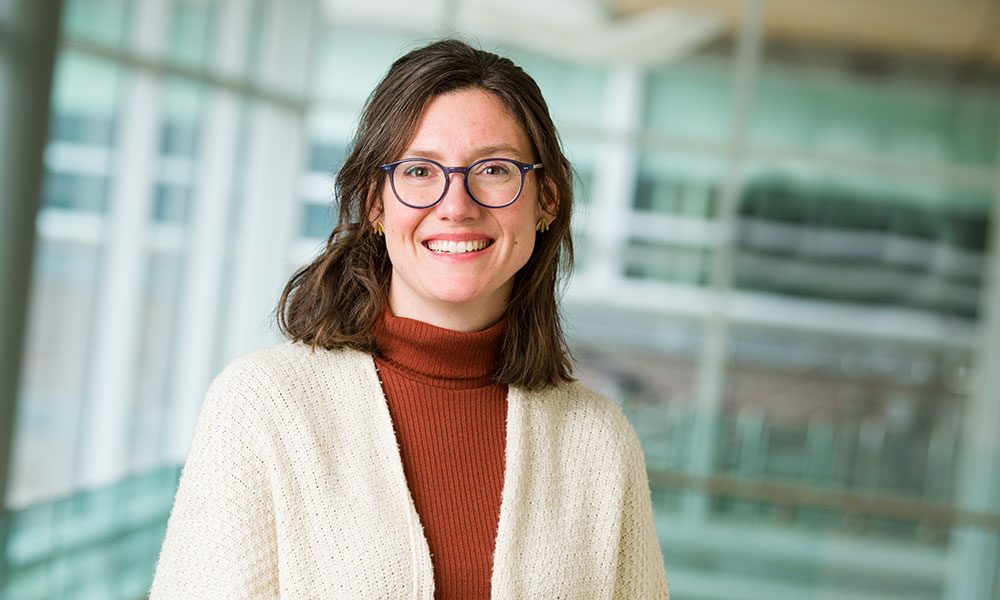It has been just over a year since Dr. Forssman joined UBCO’s innovative Bachelor of Sustainability program. We sat down with her to find out more about her vision for sustainability education, and how she plans to help students imagine and enact a more equitable and inclusive future.

Dr. Natalie Forssman, core instructor in UBCO’s Bachelor of Sustainability program.
Can you tell us a bit about your educational journey? What drew you to pursue the field you are in?
I had a wide-ranging educational path from the start, and have been privileged to work with mentors encouraging creative and critical thinking across fields. I explored math, philosophy, and cognitive science during my undergrad before discovering Science and Technology Studies (STS). STS intrigued me with its critical questions about how knowledge is produced and shared, and how power, culture, and place influence this process.
In my dissertation, my curiosity for understanding how people make sense of environments and landscapes through embodied and tacit knowledge, and technologies drove me towards the fields of history of biology, media and communication studies, and environmental anthropology. While completing my PhD in Communication and Science Studies at University of California San Diego (UCSD), I was invited to join a fascinating project in Denmark, where we explored how to combine methods from ecology and the social sciences to understand the human-altered landscapes of the Anthropocene.
Can you talk about your current role(s) at UBCO? What do you find enjoyable about them and what do you find challenging?
I teach and lead program design in UBC Okanagan’s new Bachelor of Sustainability Degree, and also teach in the Anthropology program in the Faculty of Arts and Social Sciences (FASS). I love learning from and alongside students who bring a lot of energy, hope, and diverse experiences into the classroom. Designing a program that focuses on the power and politics of environmental issues is really fulfilling. It’s the kind of problem-driven and student-centered degree I wished for in my own studies. I am so grateful for the chance to support students, learn from them, and help make their degree both wide-ranging and relevant.
What are your research interests and what questions/problems are you working on that you are most excited to explore?
I’m passionate about bringing place-based and community-based experiences to students. I’m exploring how to break away from traditional classroom formats and incorporate experiential learning, and my research explores the institutional structures that afford or limit these opportunities. I’m also working on making environmental education more inclusive by prioritizing access and incorporating diverse perspectives, including disability activism and decolonial perspectives. Finally, I am just beginning a research project that investigates the skills and habits that help students be good interdisciplinary collaborators.
What is your proudest professional accomplishment?
Seeing my impact on students and colleagues brings me pride. Whether it’s a final class project, feedback from a student about a class, or new collaborative relationships, these moments are rewarding. Seeing my students apply new knowledge, learn to be comfortable with tension and difference, and let their curiosities and unique perspectives drive their educational journeys is always energizing. I like to think of myself as working within a mycorrhizal network of connections and opportunities. Can I help build new meshes of connections that distribute nutrients in new ways, forge new connections, and create a fertile space for new possibilities? I aim to build authentic communities and support new collective possibilities.
What is the main thing you hope your students will take away from your classes?
I want students to reflect on their passions and strengths, and how they can use that self-knowledge. I strive to create a classroom where many voices are heard, and shared understandings are developed through dialogue. Many students have been taught to revere Western science and take its findings as contextless and universal truths. I appreciate opening their eyes to the complexities of how knowledge is generated.
Where do you see yourself in 10 years?
In 10 years, I hope to see our program deeply embedded in UBC Okanagan and making a positive impact on the community. I envision fruitful collaborations with community organizations and alumni bringing their insights back to current students.
Can you tell us something (hobbies, interests etc.) that your colleagues may not know about you?
I love immersing myself in fiction and enjoy trail running in the beautiful Okanagan landscape. I’ve also become a semi-regular winter swimmer in the chilly Okanagan Lake! I am grateful for the opportunity to live, work, and play on the unceded land of the Syilx Okanagan people and learn from their ways of caring for the land.